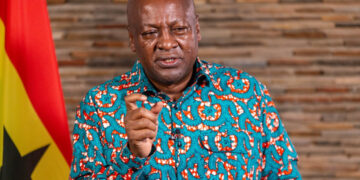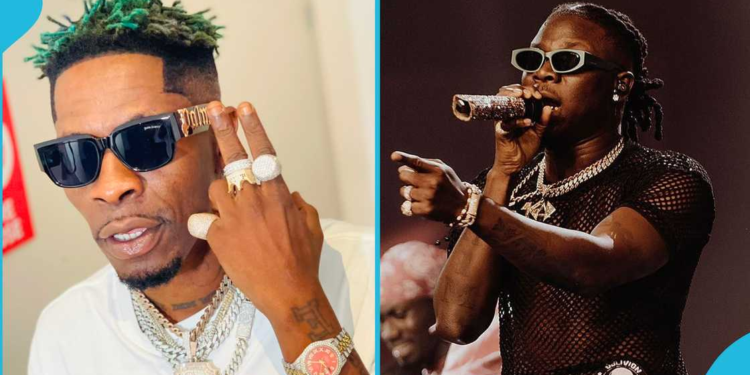Musical feuds have become a recurring theme in the music industry of Ghana, shaping its dynamics and propelling the careers of many artists.
These feuds often begin as differences in style or opinions but quickly escalate into public battles, sometimes involving personal attacks.
Feuds have existed in the musical history of Ghana during the days of highlife musicians, Nana Acheampong and Daddy Lumba to the days of Hip Life where it was only lyrical.
Names that readily come to mind include Ex Doe vs Chicago, Obrafuor vs Lord Kenya, Obrafuor vs Okyeame Kwame, Asem and all the Tema based rap artistes where they would use either the same beat or use separate beats to express their lyrical dexterity, shading and throwing counter shades at each other.
Over the past decade, as social media platforms like Twitter and Instagram have gained prominence, feuds have become more visible and public.

Dancehall musician, Shatta Wale (Left) and Ghanaian rap King Sarkodie (Right) used to be good friends but as a result of the effects of musical feuds in Ghana, they are at logger heads.
Artists such as Shatta Wale, Sarkodie, Stonebwoy, and Samini have been central figures in some of the most notable clashes.
These disputes, while controversial, have undeniably generated attention and publicity for the industry.
One of the most well-known rivalries in Ghana’s music scene was between Shatta Wale and Stonebwoy.
The two dancehall artists, who have both claimed the title of “Dancehall King,” have been involved in a longstanding feud that reached its peak at the 2019 Vodafone Ghana Music Awards (VGMA).
Read This Also: Check out full details of how Bobrisky lived in prison for six months
A confrontation between their camps led to a physical altercation during the event, resulting in both artists being banned from the awards for a time. Though the feud was eventually settled after a public reconciliation, the event sparked conversations about violence and competition in the industry, as well as how such feuds impact the public perception of artists.
In recent times, an attempt to even share a good moment on the birthday of Shatta Wale by Stonebwoy also escalated the beef to a different level, with the former feeling the latter has

While rivalries like Shatta Wale vs. Stonebwoy may have brought negative headlines, they have also increased the visibility of Ghanaian music internationally.
Both artists, despite their differences, have maintained strong fan bases both in Ghana and beyond. The media frenzy surrounding their disagreements fueled interest in their music, leading to increased streams, show bookings, and global recognition.
The power of feuds in building artist profiles cannot be overlooked in a music industry that thrives on attention.
However, these feuds have not only been limited to personal clashes. Artistic disputes also play a role, especially with contrasting genres. Sarkodie, one of Ghana’s leading rappers, has had conflicts with other hip-hop and afrobeat artists who questioned his dominance.
His feud with Shatta Wale, for instance, escalated when the dancehall star criticized Sarkodie’s contribution to the music industry. Sarkodie responded with the diss track “Advice,” which went viral, sparking a fresh wave of fan loyalty and division.
This rivalry fueled greater interest in lyrical battles and showcased the strength of rap and dancehall cultures in Ghana.

On the flip side, such feuds also reflect the challenge of unity in the Ghanaian music industry.
Some argue that prolonged rivalries hinder collaboration between artists, which could otherwise strengthen the industry. Collaborative efforts, such as those seen in Nigeria, have contributed to the rapid growth of Afrobeats internationally.
The feuds may boost short-term popularity for individual artists, but they risk creating an environment of division. In a global music scene where collaboration is key to international success, this lack of unity could be detrimental in the long run.
In addition to stoking public interest, musical feuds have also sparked discussions around mental health, professionalism, and the pressures artists face.
Constant competition and public scrutiny can weigh heavily on artists, leading to burnout or negative behavior. Industry insiders have called for more dialogue around conflict resolution and a push towards fostering a healthier environment for musicians to thrive without resorting to public disputes.
As the Ghanaian music industry grows, these conversations are becoming increasingly crucial.
Ultimately, while musical feuds have both positive and negative impacts, they remain an integral part of the entertainment landscape in Ghana.
Feuds capture public attention, create opportunities for artist growth, and can even elevate the entire industry on a global stage. However, if not managed properly, they risk fostering division and undermining long-term collaboration.
As Ghana continues to establish itself as a powerhouse in African music, the balance between rivalry and unity will play a critical role in shaping its future.




























